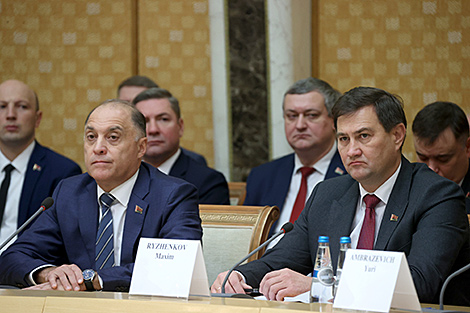Opinions & Interviews
FM: Belarus is willing to work with partners to counter illegal migration

MINSK, 15 November (BelTA) – Belarus is willing to seek ways to address illegal migration and work together with its partners, Belarusian Minister of Foreign Affairs Maksim Ryzhenkov said at the international conference in Minsk to discuss regional cooperation in combating illegal migration, BelTA has learned.
"We had to hold this conference. Speakers from the law enforcement agencies told us how serious the situation is. Unfortunately, we are not being heard. The West is not willing to hear us," Maksim Ryzhenkov emphasized. "We are ready to delve deep into this problem, look for ways to solve it and work together," the minister emphasized.
He pointed out that migration is a global concern. According to the minister, the reason for illegal migration is the policy that the collective West purses in the east, or to be more precise, the conflicts unleashed by it.
"The West says that these states had allegedly authoritarian regimes, that they were no democracies. But people in these countries still had rights: to labor, housing, education, healthcare. People lived there and did not migrate on such a scale. The West came to them to bring them 'democracy'. Today millions of people are fleeing because 'democracy' has broken all the foundations of their life," Maksim Ryzhenkov stressed.
The minister noted that the percentage of illegal migrants heading for the EU through Belarus is extremely low compared to the number of migrants fleeing through other countries. Maksim Ryzhenkov said that he does not recall the cases of, for example, the UK dressing down France publicly for noncompliance with its obligations.
"Once we had an effective system of interaction with the European Union. We used to work out all the issues together," the minister recalled.
According to him, Belarus has always accommodated the European Union, realizing that illegal migration is primarily an EU problem. Indeed, migrants keep quiet and calm in Belarus. Their main goal is to get to Europe. "This is why they do not want to catch the eye of the law enforcement agencies," Maksim Ryzhenkov explained.







 print version
print version make home page
make home page add to bookmarks
add to bookmarks

